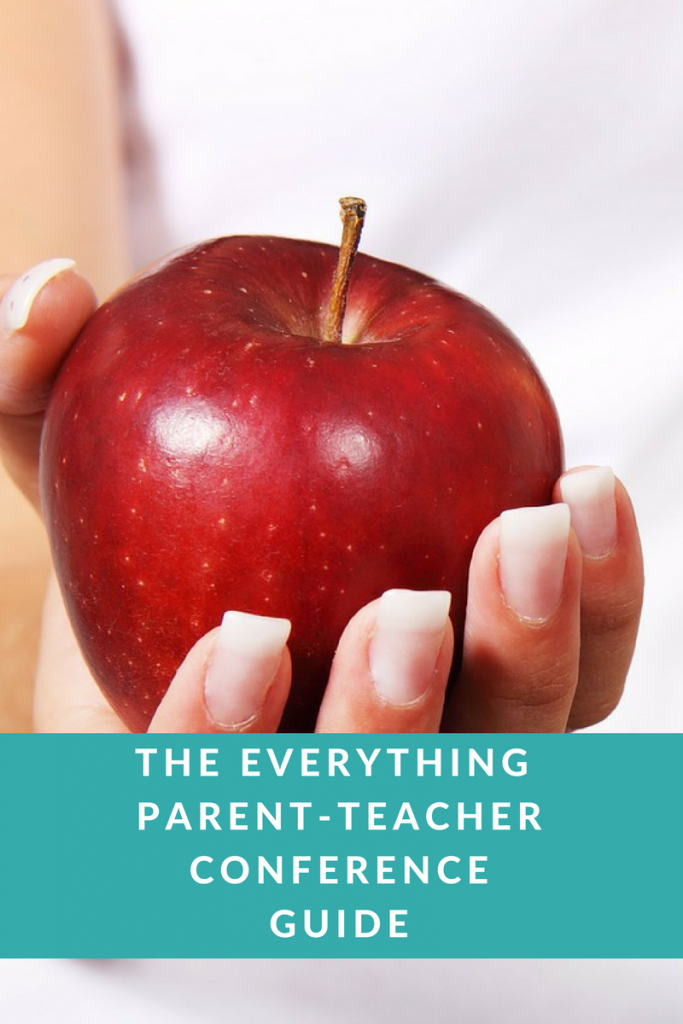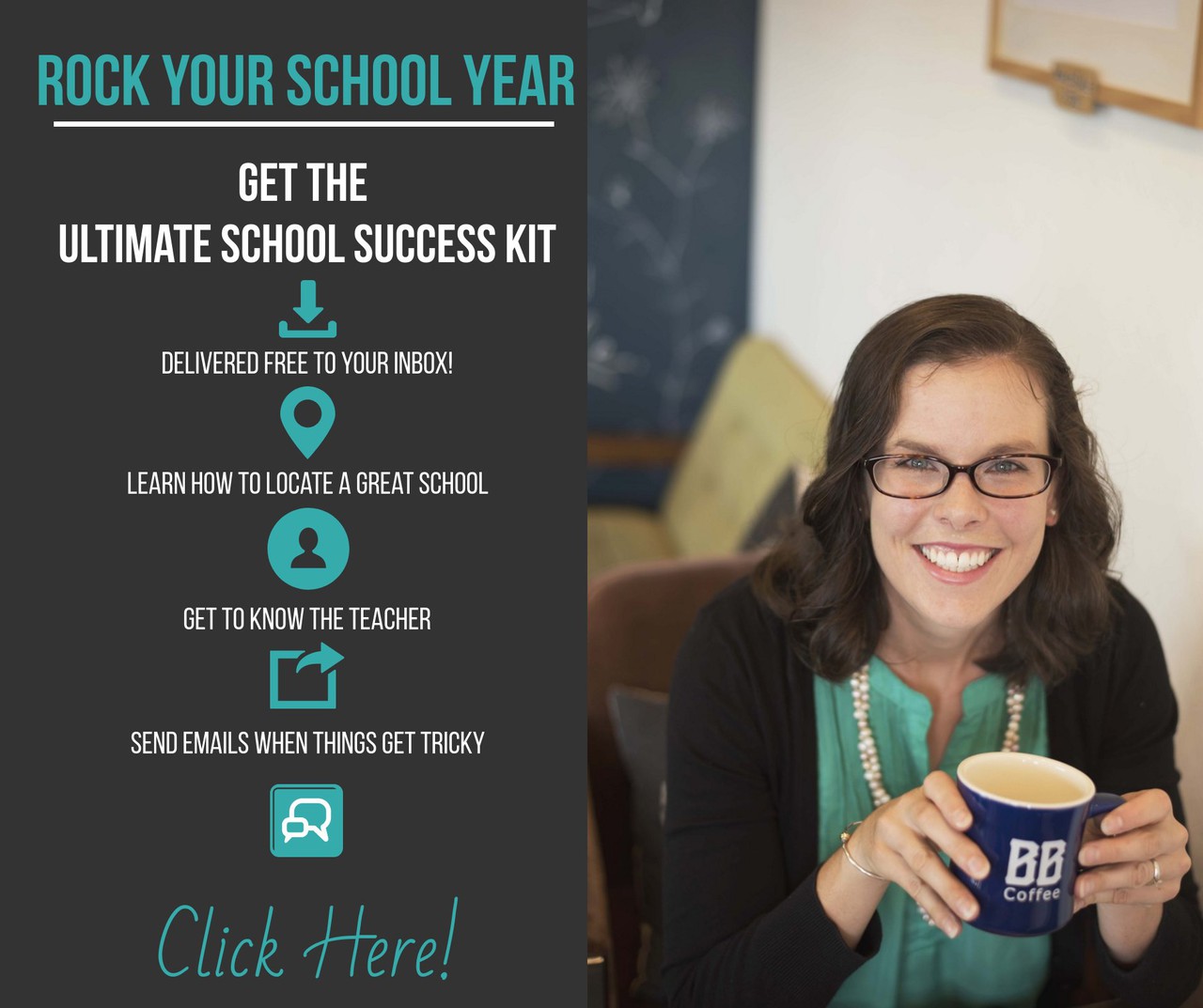 Palms are sweaty and your stomach feels a little queasy. The clock ticking on the wall seems to both be going very slowly and speeding right along. Suddenly, you hear your name called.
Palms are sweaty and your stomach feels a little queasy. The clock ticking on the wall seems to both be going very slowly and speeding right along. Suddenly, you hear your name called.
Oh no! It’s your turn to talk to the teacher. But what should you say?
If you’re nervous about parent-teacher conferences, use this cheat sheet to know exactly what to say!
Reader beware: this is a LONG one! But it’s so worth it to read through to the end. I promise you won’t regret one second you spend on this post today!
Grades:
If your child has good grades and:
- you have no concerns: “I’m excited to see (Child)’s progress this year. Could you tell me how we can continue to support him/her at home?” “Are there any areas where you think (Child) could be making better progress?” “What resources do you recommend (Child) use at home?”
- you think s/he needs to be challenged: “(Child) seems to be making good progress this year. Could you tell me how you differentiate for each child?” “What opportunities for enrichment are available in the classroom?” “How can we enrich (Child)’s education at home?”
If your child has a few trouble spots and:
- this is the first time you are hearing about it: “I’m also concerned about (Child)’s progress in (subject/class). Could you explain a little bit more about what you are seeing in the classroom? I would love to see some finished and graded work to really get the picture.”
- you already know and:
- are working with your child at home: “We’ve started to work on (subject/class/topic) at home using (method: online program, flashcards, printable worksheets, reading, etc.). Have you seen any progress so far in class? Is there something else I could be doing?”
- have hired a tutor: “We’ve actually hired a tutor! So far, they have been working on (explain tutoring focus). Have you seen any progress in the classroom?” “Is there something else they could or should be focusing on?” “Would you be able to email or talk with the tutor? I want to make sure that everyone is on the same page.”
- know that your child is in an in-school support program (RtI): “Thank you for helping my child (program/teaching strategy, like small groups). Could you share a little bit about how that is going so far? Have you seen progress?” “How is this program/group differentiated? What makes it different than the regular lesson?”
- there hasn’t been progress despite tutoring/in school support/at home support: “I know that you are working to support my child in school, and we are working at home, too. We haven’t seen good progress yet in (subject/class/topic of concern).” “What are the next steps in school?” “Should we be doing something different at home?” “Should we be considering special education?”
- there is an education plan in place, like:
- an IEP: “I know my child is having trouble in (subject/class). As you know, my child has an IEP for (something connected to that subject/course, overall education). Could you share how you are using his/her plan in the classroom? I know that the plan helps him/her access the content at his/her level, and not a guarantee of a great grade.” “Is there anything that I could do at home or with other service providers to help you in class?” “How do the support service providers in school help you? Are you able to talk with (Child)’s case manager if needed?”
- a 504 Plan: “I noticed that my child is struggling in (subject/class). Could you share a little bit more about your concerns and what you are noticing?” “Could you share how you are including his/her accommodations in the classroom?” “What other changes might be needed to better serve my child?” “Do you think that (Child)’s disability has started to negatively impact his/her ability to access the curriculum?”
 Behavior
Behavior
If your child’s behavior is good, and:
- there have been no issues or concerns: “Could you share a little bit about my child’s social circle?” “Could you share about my child’s work habits?” “Could you share about my child’s (book choices/fast finisher choices/playground choices)?”
- there have been issues with friends outside of school: “I wanted to let you know about (situation).” “I know that my child isn’t in class with these students. If something should happen or spill over in school, I would like to be informed (with a phone call/via email)” “I know that my child is in class with these students. I would prefer that they not be grouped together or allowed to sit near each other. Should something happen, please let me know right away (with a phone call/via email).”
- has been bullied at school: “I need to let you know that (situation) has been happening at/in (place) between (Child) and (other students).” “I know that these students are not in class together and (place) is the only time they interact. Who should I speak to about this situation?” “I know that these students are in class together. I would like them to be separated and observed as much as possible, especially in (place). Could you make sure that they are not in small groups or sitting together in your classroom?” “Would you let other teachers know about this situation? While I do want to keep this as private as possible, I do want to protect my child.” “Would you please let me know if you observe or hear anything about this?” “Would you be able to inform (other students’) parents about this situation? I know that you do need to maintain confidentiality, but I also feel like this is something that does need to be addressed at home.” “Should I alert the principal or vice principal about this? Would you help me?”
If your child has had some behavior concerns, like:
- not being able to sit still: “I know that (Child) has a hard time sitting still for long periods.” “Can you tell me some ways that you think s/he could get the fidgets out and focus better in class?” “Would allowing my child short breaks to (take a walk/do some exercise in place/do another brief activity) be possible? I think that breaking up his/her work could help her focus.” “Would it be possible for my child to have (a fidget/wiggle seat/exercise ball/exercise band/other fidget tool) in class? I think having something to do with his/her hands might help him/her focus better on the lesson or work.”
- inappropriate language in school/on the bus: “I would love to discuss the language (Child) used in/at (place) on (dates). Could you explain exactly what my child said and the whole context of the verbal exchange?” “Who was this language directed at?” “What was the immediate consequence? Why?” “Is this repeated behavior?” “What would you suggest we do if this happens again in the future?” “Are there resources at school that might help my child?”
- aggressive behavior: “I would love to talk about (Child)’s (behavior). Could you explain to me what has been happening with him/her? Specifically, I would like to know where and when s/he is acting out, as well as who is around and what has happened earlier in the day and right before the behavior begins.” “Has this happened more than once?” “What was the immediate consequence? Why?” “If (behavior) continues, what happens at school?” “Are there any resources at school, like counseling, that might help?” “What would you suggest we do at home?”
- work completion: “I understand that my child is refusing/unable to complete work. Could you explain what is happening a little bit more?” “What has already been tried to motivate him/her?” “Do you feel like there might be an underlying issue or concern that is playing into the lack of work completion?”
- cheating: “I understand that (Child) has been caught cheating on (assignments) (number of times). Could you explain a little more about the situation with me?” “How did you know s/he was cheating?” “How was (Child) cheating?” “What were the immediate consequences?” “What happens if this behavior continues?”
- lying: “I understand that (Child) has been lying about (subject of lies) to (students, teachers, staff, etc.). Would you explain a little bit more about the situation?” “How did child react to being ‘caught’ in a lie?” “Was anyone harmed as a result of the lie?” “What was the immediate consequence of lying?” “Is this becoming a pattern or repeat behavior? Should we be concerned about this in the big picture?”
- defacing/destroying property: “I understand that (Child) has been caught/implicated in the destruction/defacement of (property) belonging to (school, school staff, other students, etc.). Could you share a little bit more about this situation?” “Were any other children involved? I know you can’t identify other students, and respect that. I just want to know if (Child) could have been influenced by others.” “What is the evidence of this? I’m not questioning that it happened, I just want to have all of the information.” “What was the immediate consequence?” “What are some possible long term consequences?” “Is this part of a larger pattern of behavior?”
- has been identified as a bully: “Could you explain how my child is bullying other students?” “Where is this behavior mostly occurring?” “Are the other students in this class?” “Are there counseling services available to help (Child) change his/her behavior?” “What other support or options are there in school? Obviously, we want to prevent this behavior from continuing.” “What are some options for us to use at home to address this concern?”
Gifted Education
If you want more information about your child’s current gifted placement: “I would like more information about my child’s current placement. Who could I speak to about this?”
If you want more support in the classroom: “Could you explain what is already happening in the classroom to differentiate for students?” “How could we help support your enrichment program in the classroom?”
If you think your child might qualify for gifted education: “I think that (Child) might be a good fit for the gifted program because (grades/interests/personality/other). Could you share a little more about the gifted program?” “Who do I contact to find out more about the criteria for placement in the gifted program?”
Special Education
I could literally write a book JUST of talking points, email templates and scripts for special education. Seriously.
Generally, a lot of the questions in this post can be used in any special education situation. Mostly, you want to make sure that the teacher/school are complying with your child’s plan completely. You also want to make sure that your child is placed in the least restrictive environment (LRE: a place where your child is safe and working with peers as much as possible, accessing lessons at their personal academic level) and is actually learning (FAPE: free access to public education).
You should bring a copy of the IEP with you, plus one for every teacher/provider who will be at the meeting. Make note of any concerns that you have when you plan your script for the conference. You could even strategically highlight portions of each staff member’s IEP to being their attention to particular points.
If you have lots of concerns or don’t feel heard at your conferences, consider hiring an advocate. Email me to find out how I can help you at school!
How do you know what to say at your parent-teacher conferences? Share your best PTC prep tips in the comments!
~Meg
Check MilKids out on Twitter, Pinterest, Instagram, and Facebook! Subscribe to my email list for email updates and free printables!

